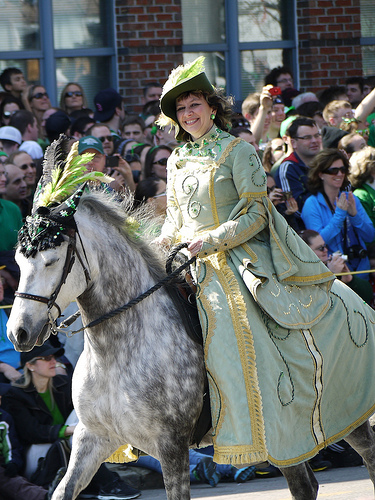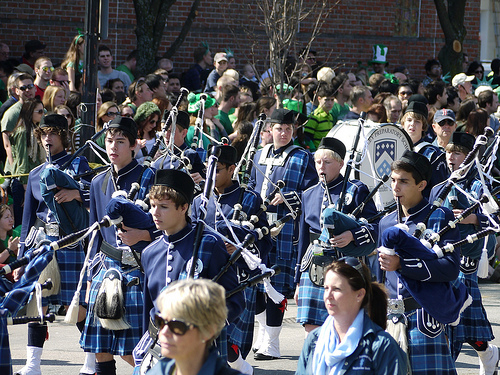Photowalk in Boston, 2012-05-27 —

External links:
photographs on github on google+ on linkedin on twitter on youtube
Most popular tags:
ethics gnome guitar kernel linux olpc photography

All photos are CC-BY-SA 3.0, and there are more in this Flickr set.
Update: I did some color correction (on half of the images) and I think the difference is pretty stunning. Mental note: if you take photos on a hazy day, play with compressing the curves afterwards.
LuminanceHDR is an excellent free software project for creating high dynamic range photographs from a collection of exposure-bracketed shots of the same scene — first it aligns your photographs using tools from the Hugin project, and then lets you choose between HDR tone-mapping algorithms to create the final image with. Here are some of my photos from the last year processed with LuminanceHDR’s implementation of the Mantiuk ’06 algorithm, with parameters of contrast=1.0 and saturation=1.2, all available under CC-BY-SA 3.0. (Since the thumbnails below are small, you might prefer to use this Flickr slideshow to see them up close.)

My attempt at Letting Go, by Andrew York:
Andrew York – Letting Go (youtube / download as WebM, CC-BY-SA 3.0)
I didn’t pay much attention to sports when I lived in England. They’re much harder to ignore now that I live in the US, especially in a competitive town like Boston where each of the national titles in basketball, American football, ice hockey and baseball have been won by a local team at least once since 2000.
Mad just won her lab’s March Madness bracket (this involves making predictions on the winners and losers of 63 college basketball games, and getting more of them correct than the other people who are competing with you) so we’ve watched a lot of basketball games recently, and I like to watch my countryman1 Andy Murray play tennis when I can.
I’ve also been trying to decide what my favorite sport is. Sometimes people ask you things like that here. I think they’re mainly asking to see whether I say something “outlandish” about soccer being better than American Football, or cricket being the zenith of physical competition between teams. I find that I enjoy watching basically all of them, especially with friends. My actual answer is long and complicated, so I’ll write it out here. I’m going to concentrate on popular sports in the US, since that’s where I live now.
As Mako pointed out to me, it’s rarely worth tuning in to a basketball game before the last five to ten minutes. A 10-15 point deficit is by no means insurmountable with ten minutes left to play, and teams are rarely more than 20 points ahead by then. You generally won’t have missed the decisive portion of the game if you wait until the last quarter to start watching, which makes watching the first three quarters feel unsatisfying somehow.
The NBA tries to make the league more competitive between teams by having a draft where the teams that didn’t make the playoffs in the previous season get the first choice of upcoming college players in the new season; it also has a salary cap and luxury tax. I like these ideas in principle, but they don’t seem to be working in practice yet: the NBA has teams that repeat championship wins more often than the NFL, showing that these rules are not working to break up domination by a few teams.
Morale seems to be a particularly visible aspect of basketball given the frequent scoring — one team going on a 10-0 run is common, often with the other team coming back with a reversed run later, and that’s satisfying to watch.
Basketball seems especially prone to having games be decided by controversial referee decisions, most of which can not be appealed or corrected.
Baseball has no salary cap, and has the far worse equivalent of a luxury tax which sends money to the MLB organization itself when a team pays over a salary limit. This does not bother teams like the New York Yankees or Boston Red Sox, which continue to spend ridiculous amounts on players undeterred. The last game of the 2011 season, between the Red Sox and the Tampa Bay Rays, was between a team with a $156M payroll and a team with a $37M payroll2. Why is that supposed to be fun or fair to watch? I guess it could be fun if you always cheer for the team that is vastly outperforming its payroll (as Tampa Bay did against Boston that night!), but otherwise I don’t see the point.
As for Mako’s decisive-moment metric, baseball almost has the inverse problem to basketball — a bases-loaded homer in the 3rd inning (for example) can often decide the game right there, so you have to start watching at the beginning to be confident of not missing a decisive play. The games are pretty long too. I think there’s a middle ground between early-decisiveness and last-minute-decisiveness that I prefer instead.
I like that the NFL has a direct salary cap, so no team can spend many times more on players than another team as they do in baseball. I also like the amazing speed, agility and split-second instincts that NFL players exhibit. The decisiveness seems about right. The system for appealing rulings and referring to instant replays works well.
But I hate that the NFL has a problem with chronic traumatic encephalopathy that it is basically doing nothing about. Many veteran players are suffering from this form of early-onset dementia. This exposé by GQ in 2009 (GQ, really?!) is completely damning, and I think it should be required reading for anyone who watches NFL football. There’s also Malcolm Gladwell’s article in the New Yorker directly comparing American football to dogfighting, which seems sound to me.
But wait, you say! This season the NFL instituted new rules on what type of hits are allowed. These rules entirely miss the point — as you’ll read in the GQ article, professional footballers take the equivalent of multiple car crashes of sub-concussion every game, and none of the plays that cause these sub-concussions were illegal before the new rules or are illegal after them. The new “devastating tackle” rule bans tackles that look gruesome, while leaving alone the hits that are known to cause permanent brain injury when repeated as they are on almost every play. It’s a cover up, and the player-safety equivalent of security theater.
We also don’t get to see NFL teams practice, yet the HITS data referred to by the GQ article suggests that practices contain many sub-concussions too, and can be as damaging as the games themselves. If the players spend 80% of their time practicing and 20% playing in season games, then practice could be responsible for 80% of the brain injuries due to concussion they get, and we don’t even see it happening.
My preferred solution is to remove helmets altogether, as rugby does. Faced with the option of colliding heads at 100 gs of force but without a helmet, it seems likely that players would just decide not to do something so ridiculous with their heads.
I’m not at all expert in ice hockey, but it seems to me that it has the same safety problems as football, plus legalized and celebrated fighting between players. Gross.
It’s nice to have an individual sport as well as team ones. Psychology and willpower often seem to become the dominant factor in who wins a game, and that’s exciting to watch. I guess it ties back into my experience playing Chess and Go, and individual tennis might be my favorite sport for that reason alone.
At first glance it seems like tennis has the same decisiveness problems as baseball, with it being hard to come back from an early deficit, but it doesn’t really. Tennis doesn’t keep an absolute cumulative score in the same way as baseball — you can lose the first set in a 1-6 blowout and win the second set 7-6, and then everything’s all square again even though you only won 8 games and your opponent won 12. The baseball equivalent would be something like if you could make up for your opponent’s third-inning bases-loaded homer with a well-timed single run afterwards, and that would certainly keep the games closer.
Tennis refereeing decisions can be appealed with a challenge system that works well.
Has the “beginning of the game can decide the match” problem of baseball. Clubs refuse to institute a salary cap, leading to the same kind of disparity that baseball has between teams — in 2008, the median Premier League total team salary was $44M/year, yet Chelsea spent3 $172M/year!
Worse, continuing to refuse to use instant replay to correct poor referee decisions (in 2012!) is basically unforgivable, and caused significant international dispute during the last World Cup. Peter Singer wrote an article about the ethics of cheating in football that I agree with wholeheartedly; I don’t think soccer players make good role models under the current rules (with the possible exception of Lionel Messi’s refusal to flop).
Singer looks for an instance of overtly ethical play in soccer, but even the one example he manages to find is not a good one. He mentions Robbie Fowler in 1997 being awarded a penalty which he tries to decline, but the referee insists that he take it. Singer says that Fowler takes the penalty “in a manner that enables the goalkeeper to save it”, but that’s not what happens — the keeper does get a hand to the shot, but then it spills back out and one of Fowler’s teammates puts in the rebound for a goal. If Fowler actually wanted to decline the penalty, he could have simply not aimed it at the inside of the goal. Fowler says that he was not intending to miss, and was playing with acceptance of the referee’s decision even though he didn’t agree with it.
Okay, so I have complaints and likes about every sport. How do I decide which one is my favorite? In the true spirit of utilitarianism, I have a nerdy idea about comparing sports against each other using the axes I care about directly: the satisfyingness of Mako’s decisive moment‘s timing, the long term safety of the players, the impact of referee decisions on the outcome and the impact that money has on the strength of each team; but I’ll break this post up here and wait until my next post to detail my calculation. Of course, these variables might be much more important to me than to you. What do you think? Are there more variables that you’d add for consideration? How does your favorite sport stack up in these metrics? Do you want to set me straight on ice hockey?
1: No, I’m not trying to claim that Andy Murray is English like me; he is Scottish. But apparently the United Kingdom is a country that consists of countries, even though that makes no sense, so he’s still my countryman.
2: Figures are from http://baseballplayersalaries.com/.
3: Stats from http://www.trophy4toon.co.uk/salaries.html. I can’t find total salary data that’s newer than 2008.
Catching up on more guitar pieces that I hadn’t recorded yet — this lament is by a Belgian composer, Armand Coeck:
Armand Coeck – Lamento (youtube / download WebM version, CC-BY-SA 3.0)
Mad and I went to the Boston St. Patrick’s Day Parade today for the first time, along with a bunch of friendly photowalkers I met on Google+. Here are a few photos I took, the rest are in this Google+ album or this Flickr set, available under CC-BY-SA 2.0:








Time for a new guitar recording — here’s Thierry Tisserand’s composition “Dès l’aube” (“At Dawn”), from his triptych “Folk Songes“.
Thierry Tisserand – Dès l’aube (youtube, download WebM version)